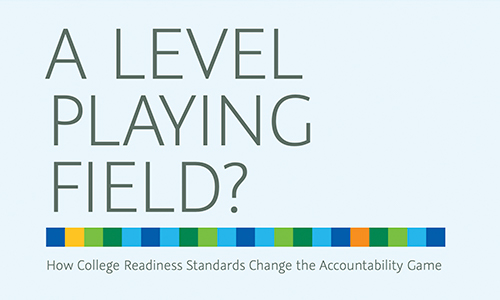

A level playing field: College readiness standards
Some of our assumptions about the growth and performance of students from high-poverty schools relative to their peers from wealthier schools may be challenged in this data gallery, where you can explore how school poverty level interacts with student growth, college readiness, and college access.
By: Michael Dahlin, Beth Tarasawa
Topics: Equity, College & career readiness


Moving from data to making a difference
The problems faced within education resemble the problems in many social settings in that they lack clear definitions, have many potential causes, lack simple solutions, and defy straightforward measurement. In this article, Andrew Hegedus shares a view on the types of problems faced in education and outlines key characteristics of a process that begins with collecting data and ends with evaluating progress.
By: Andrew Hegedus
Topics: Empowering educators, High school, High-growth schools & practices


Using test scores for teacher evaluation: Why caution is necessary
This article offers insight and guidance on issues to think about before tests are used as an evaluation tool and to help ensure better choices are made about the role test scores play in a teacher’s evaluation.
Topics: Empowering educators, Student growth & accountability policies


An investigation of examinee test-taking effort on a large-scale assessment
Most previous research involving the study of response times has been conducted using locally developed instruments. The purpose of the current study was to examine the amount of rapid-guessing behavior within a commercially available, low-stakes instrument.
By: Steven Wise, J. Carl Setzer, Jill R. van den Heuvel, Guangming Ling
Topics: Measurement & scaling, School & test engagement, Student growth & accountability policies


Examine construct validity of computerized adaptive test in K–12 assessments
The purpose of this study is to investigate the effect of missing data in computerized adaptive tests (CAT) on test construct validity.
By: Shudong Wang, Hong Jiao
Topics: Computer adaptive testing


For decades, researchers and practitioners have made a great deal of effort to study a variety of methods to increase parameter accuracy, but only recently can researchers start focusing on improving parameter estimations by using a joint model that could incorporate RT and students information as CI.
By: Shudong Wang, Hong Jiao
Topics: Test design


Do high flyers maintain their altitude?
In the visualizations in this exhibit, you can compare the performance and growth of various groups of high achievers to that of their peers over multiple years.
By: Yun Xiang, Michael Dahlin, John Cronin, Robert Theaker, Sarah Durant
Topics: Equity, High-growth schools & practices


